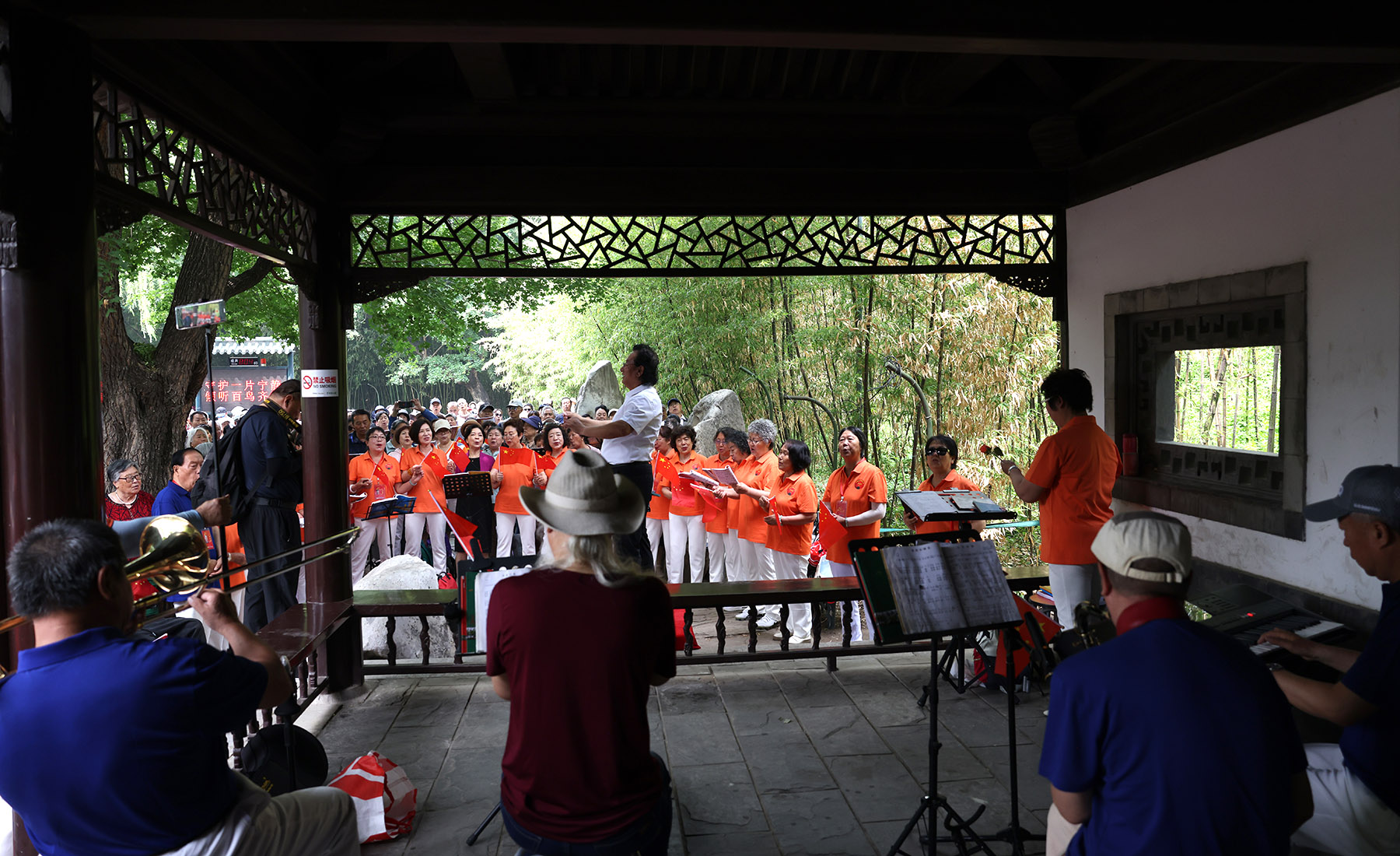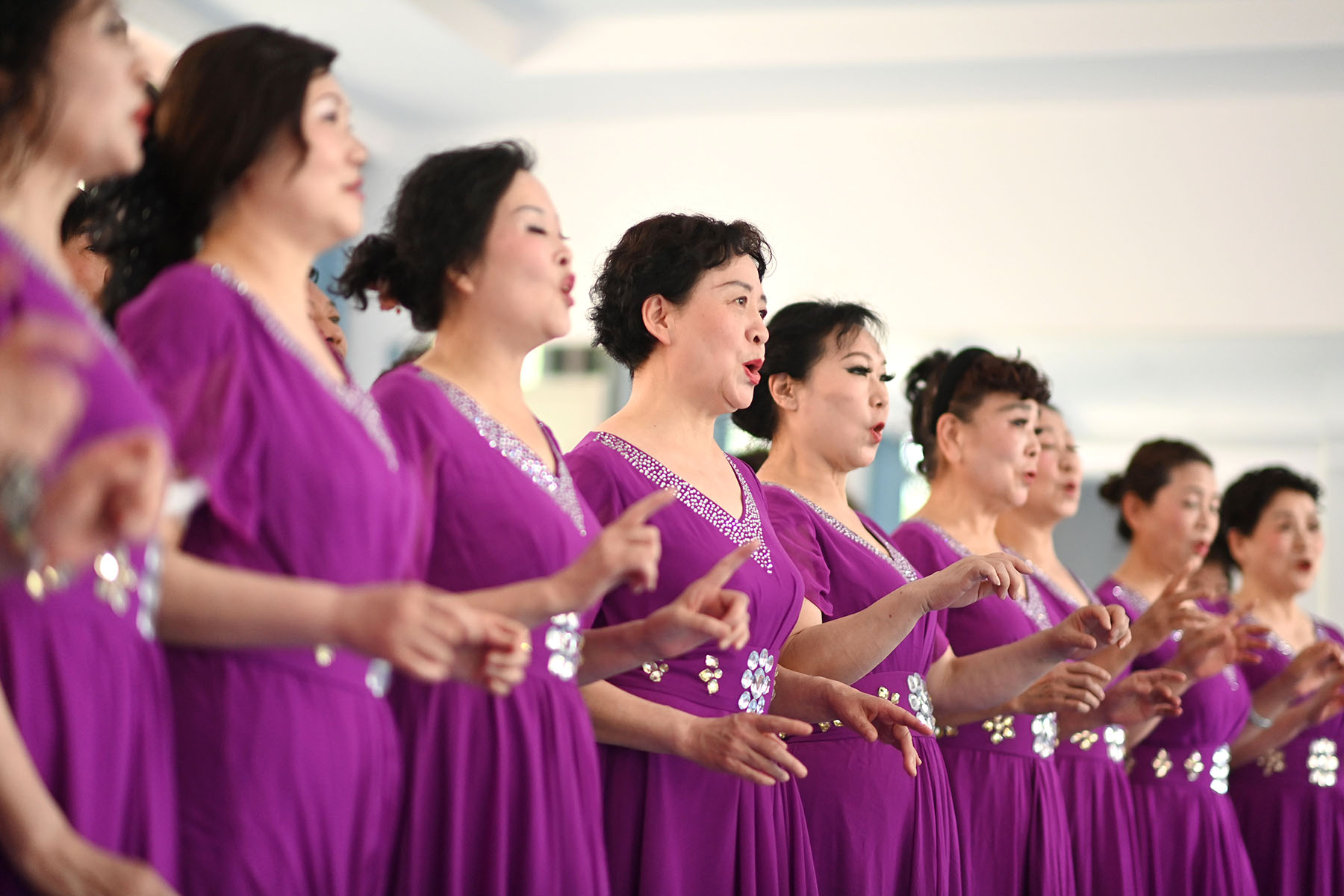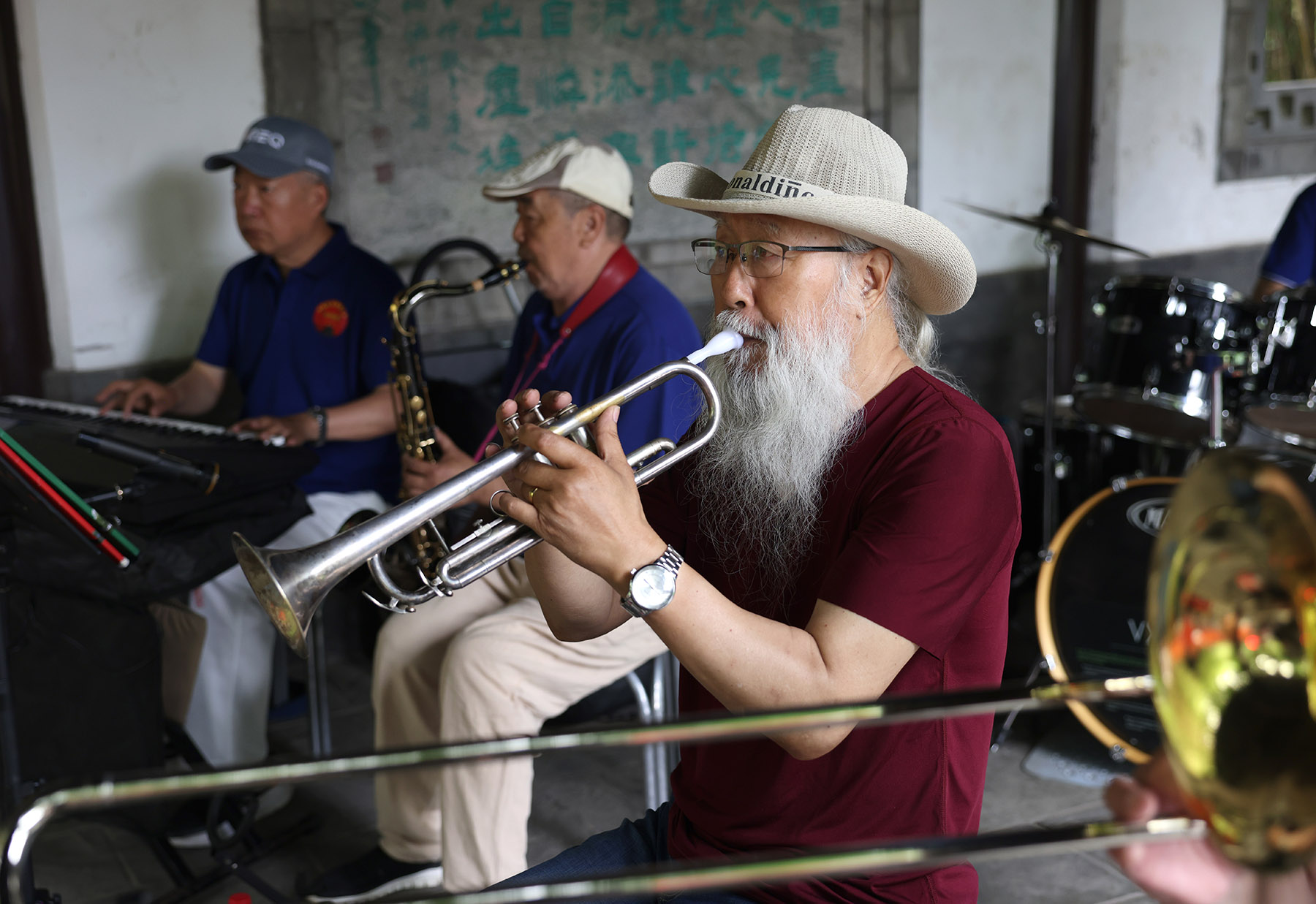Singing groups help members alleviate loneliness, improve cognitive capacity

At 8:30 am on May 22, a group of seniors wearing colorful clothes began gathering at a small pavilion in Beijing's Zizhuyuan Park, a scenic spot with lakes, pavilions and clusters of bamboo.
They greeted and chatted with one another, took songbooks from their bags, drank water and cleared their throats.
At 9 am, amid the tranquil surroundings and shaded pathways, they formed circles in preparation for their performance.
Yan Lanying, a retired waitress in her early 60s, picked up a microphone and announced the start of the performance, and the conductor, Li Yongkang, standing on a stone step, waved his baton.
The seniors, who are members of the Beijing Health Voice Choir, performed more than 20 songs in two hours, attracting the attention of passersby, some of whom joined in the singing. At the end of each song, the choir members and spectators warmly applauded.
READ MORE: Creative seniors share their lives online
"Lots of senior citizens gather together to perform choral singing and we have developed a number of choir branches across the country, attracting over 10,000 people who are mostly above 60 years," said Li, the 67-year-old founder and leader of the Beijing Health Voice Choir.
Every week, Li and the choir perform at three locations in Beijing — Zizhuyuan Park, Madian Park near the North Third Ring Road, and Wangjing Cultural Square in the city's east. The choir has also traveled to other cities including Xi'an, Shaanxi province, and Pingyao, Shanxi province, to join in performances with other seniors' choirs.

Improving well-being
Far from just a musical pastime, being part of a choir has profound significance for the mental, emotional, and social well-being of the elderly, Li said.
Li Baolin, 77, is a member of the Beijing Health Voice Choir. Before joining the choir in 2015, he enjoyed taking two of his grandchildren to Zizhuyuan Park and listening to the singers.
"I was drawn to the sounds of the choir. They not only had a conductor, but also a live band. I always loved singing and I could sing all the songs they performed when I first watched their performance," recalled Li Baolin, who travels to Zizhuyuan Park by taking a 30-minute bus ride.
When one of his grandchildren started primary school, Li Baolin decided to join the choir, a decision supported by his family.
"I join in the choir activities three times a week, which has become one of my favorite things to do now. Two hours of singing fills me with energy for the whole week," said Li Baolin, a retired researcher who worked at the Chinese Academy of Sciences.
The conductor selects songs that senior people know and appreciate, he noted.
"The members of the choir are of a similar age and we grew up listening to those songs, mostly patriotic songs, which resonate with the shared experiences and memories of the choir members," he said.
"For seniors who have been retired for a long time, many of whom may be dealing with loneliness, loss, or health challenges, engaging in choral singing offers a lifeline to joy and companionship," said Li Baolin.
"My wife's health is not very good, so she spends much of her time at home taking care of our younger grandson, who is only two years old. My children are all adults and they are busy with their lives and work."
He said singing in the choir brings him health and happiness, and puts him in a "beautiful mood", which also benefits his family.
Not only does he attend rehearsals, but he also arrives at the park around 7 am on performance days to help carry instruments and speakers. "Life feels incomplete without singing. For us elderly folk, this is much better than seeing a doctor and taking medicine," he said.
One choir member surnamed Zhang, spends nearly two hours traveling from her home outside Beijing's Sixth Ring Road to participate in choir activities.
Despite the need to rise early to make the journey, she is always filled with anticipation knowing that she will soon be surrounded by fellow choir members and sharing in the joy of singing.
"Before each activity, the conductor sends us messages in the group chat. Many members arrive at the park 30 minutes, or even earlier, before the choir starts to perform. Our faces are radiant with enthusiasm, just like meeting with old friends," said Zhang, in her 60s, who is also retired.

Building confidence
The seeds of the Beijing Health Voice Choir were planted more than 15 years ago.
That year, Li Yongkang, a retired singer who also had some experience conducting, moved from Datong, Shanxi province, with his wife, to live with their daughter in Beijing after both of them retired. One day, the couple visited the Temple of Heaven, a popular park and tourist site, where they saw a group of senior people singing together.
The couple joined in, and after one of the choir members learned that Li Yongkang was a retired singer, the member encouraged him to conduct the choir.
"The atmosphere was great and as more and more people gathered, I started to conduct," recalled Li Yongkang.
In 2011, he founded the Beijing Health Voice Choir.
Many seniors enjoy singing with Li Yongkang, thanks to his confident and powerful conducting style.
He selects the choir's songs — from patriotic ones, to popular soundtracks from classic Chinese movies and TV dramas — and coaches the seniors on choral singing.
"My goal is not about taking their singing skills to a higher level. What I want to do is to make them feel confident and happy about singing, and about their lives," said the conductor.
He also noticed that the majority of his choir members are "elderly migrants" who had moved to Beijing to help their children with household chores and child care.
"Away from their familiar hometowns, fatigue and loneliness have become the main themes of their lives. Despite the challenges of adjusting to a new environment and the loneliness that often accompanies old age, they found comfort and a sense of belonging in the choir," he said.
Wei Fengying, 65, who watched the choir's performance at Zizhuyuan Park in May said she wanted to join the group.
"I sang with them while standing at the back. From the moment I raised my voice to sing the songs with them, I was hooked. I never imagined that singing could bring me so much joy," said Wei who moved to Beijing from northeastern China about five years ago to take care of her newly born granddaughter.

Second family
But the journey of the Beijing Health Voice Choir has not been without its challenges.
Li Yongkang has often found himself grappling with the pressures of balancing the choir's activities with the demands of its members. From securing rehearsal spaces to managing equipment and personnel, he has worked tirelessly to ensure that the choir continues to thrive. Diagnosed with diabetes, he also needs to take care of his own health.
His wife, Ji Xiangyu, a 62-year-old retired medical worker, is worried about her husband's health, but admires his devotion to the choir.
Before each performance he selects and irons his own clothes, she said. "He also works out different song lists for the activities. For example, on Mother's Day the choir sang songs about mothers," said Ji, who is also part of the choir.
"Many choir members are women. We also share our ideas about fashion and cooking skills after the activities. What we do together is beyond singing," she said.
After a performance, the choir members share a meal at a restaurant, which has become a way for them to bond and deepen friendships.
Ji has named the choir a "health voice" as their mission is to bring joy and positivity through music, which benefits the seniors' health.
"Some of the choir members struggle with diseases, such as cancer and depression. Choral singing is more than just a hobby — it is a source of strength and joy," Ji added.
"Through shared rehearsals, performances, and social events, these groups create a supportive network where seniors can find friendship, encouragement. For some, the choir becomes like a second family, providing emotional support during difficult times."
Li Gang is a professor at the music school of Capital Normal University who has been conducting research on choral singing and promoting the activity among seniors. Studies have shown that music therapy can reduce symptoms of depression, anxiety, and cognitive decline in seniors, while also improving their overall quality of life, Li said.
"Choral singing provides a unique combination of cognitive stimulation, physical activity, and social interaction, all of which are essential for maintaining mental health in senior people," he said.
In parks across the country, seniors have various activities to make their lives fun and healthy, he said, including singing and dancing, playing musical instruments and enjoying ping-pong games. "They all have similar functions, that is, to meet the spiritual and emotional needs of senior people," Li Gang said.
He noted that one of the major benefits of seniors' choral groups is the sense of community they foster.
"For many participants, these gatherings provide a much-needed opportunity to connect with others who share their love of music and their life experiences," said Li Gang, adding that the physical act of singing requires deep breathing and breath control, which can strengthen respiratory muscles and improve lung capacity.
He also called on songwriters to create more Chinese songs for seniors to expand their song lists and inspire them to learn new songs.
Expanding repertoire
On May 9, the China Chorus Association announced it was working on a project with the Zhejiang Conservatory of Music and People's Music Publishing House to encourage Chinese musicians to write songs for choral singing. The project kicked off in March and will wrap up in July.
Since 1999, the China Chorus Association has been holding choral singing festivals for seniors from across the country. This year, the festival will take place in Weihai, Shandong province, in October,
"We've already had 12 editions of the singing festival for senior people and every edition attracts thousands of senior people from around the country," said Li Yan, who is in charge of the event.
ALSO READ: Seniors find an appetite for community canteens
"Choral singing is very popular among Chinese people, from children in schools to senior people in parks. Its ability to evoke emotions and memories makes it a potent tool for healing and connection."
Li Shuyun, a member of another seniors' choir which sings five days a week at Beijing's Taoranting Park said: "Park choirs attract many elderly individuals, primarily because of their low entry barriers, which can cover a broader range of elderly individuals without musical backgrounds. In this environment, they relieve pressure, and feel more free and relaxed".
Named Harmony and founded six years ago, the choir has about 500 members, mostly retired people 60 to 90 years old. Li Shuyun is a co-founder of the choir.
"After retirement, I felt isolated from society. My kids are all grownups and I didn't want to become a burden," she said. "However, after my husband died, I didn't know how to go on with my life. Luckily, I found a new life in singing."
Li Shuyun said in the beginning she just sang along to tapes by herself in the park. Gradually, she found friends who shared a passion for singing. Now, singing with the choir gives her a reason to get out of the house and meet new people, she said.


